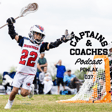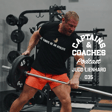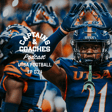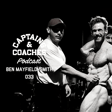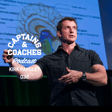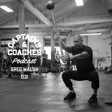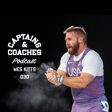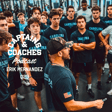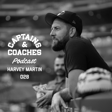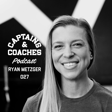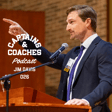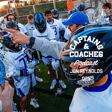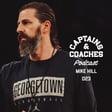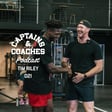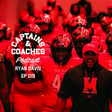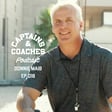Introduction and Podcast Overview
00:00:00
Speaker
the greatest defense in the world but gang it up to me understand that let me talk together po and we serve that but to understand but eleven let's but but yeah go' so good there're no odds on three one do job Welcome to the Captains and Coaches Podcast where we explore stories that shape champions both on and off the
Interview with Jack Posey
00:00:19
Speaker
field. Today I traveled to La Crosse Barn in Dallas, Texas to sit down with professional lacrosse player Jack Posey.
Transition from High School to College
00:00:26
Speaker
We discussed training jump from high school to college and how to find inspiration on your team even if you're not getting playing time. Learn how Jack challenged the standard college recruiting playbook and navigating that maze to find value
00:00:40
Speaker
in a college team that he could help build.
Overcoming a Knee Injury and Comeback Story
00:00:42
Speaker
What truly sets Jack's story apart is the moment that could have ended his career. When a devastating knee injury struck senior year NCAA playoffs, he faced a choice. Let it define his limits or use it to redefine his potential. His response to this challenge trend transformed a potential career ending setback into the catalyst that propelled him to the premier lacrosse league's Carolina
Resilience in Sports and Life
00:01:07
Speaker
Consider this podcast a masterclass in resilience, finding people to lean into, and the art of the comeback. Whether you're an athlete, a coach, or a parent, get ready for an inspiring discussion about turning obstacles into opportunities and setbacks into comebacks. Now, time for Jack Posey to help us raise the game together. Ready, ready, and break.
Mentorship and Gratitude
00:01:45
Speaker
Yes, sir. Thank you for having me, Tex. Appreciate you. Welcome to the show. We need to shout out to Coach Tindall for allowing us to record the podcast here. And then Justin Cavanaugh for making the introduction. Yeah, man. I mean, both both Coach Tindall and Coach Cav have significantly changed my life and just to be here with you and to be able to have this opportunity to be on your podcast because of those two. I mean, um that's just the the beginning of where that gratitude starts for those two guys. but Yeah, I'm excited to be here and excited to dive into everything we got going forward.
Multi-Sport Beginnings and Shift to Lacrosse
00:02:20
Speaker
Let's start with that cab introduction because you were Northern Virginia high school lacrosse player. Correct. Was there any other sports involved or was it lacrosse? Yeah, so growing up, I played like a bunch of sports. So it was like basketball, football, ah ah baseball, lacrosse. And then when I got to high school, it shifted to only football and lacrosse.
00:02:43
Speaker
um Originally I wanted to play football. I thought football was super cool. um I was a linebacker growing up and Ray Lewis and London Fletcher were like my idols and um Who's your pro team? My pro team? I'm from DC, so the commanders. um Go commies, all right. yeah But no, man. So when I was in high school, I wanted to play football initially. I actually ended up getting injured. I tore my labrum in my shoulder, my sophomore year in Canada. On the football field? Yeah, yeah, yeah. I got my ankles broken. And when I got my ankles broken, I reached to grab somebody. and
00:03:20
Speaker
Pop mushroom to shoulder. So add, uh, add injury to insult. But, um, yeah, after, after that, I got surgery and I realized you can talk about a little bit more in detail later, but then I realized the cross is where my true passion was. And that's where my talent was as well. And after my sophomore year, I stopped playing football. So I was a football and lacrosse freshman and sophomore year, and then junior and senior year was just lacrosse.
Impact of Multi-Sport Experience on Lacrosse Career
00:03:47
Speaker
Side question as we work through your journey, do you feel playing multiple sports growing up benefit you in the long run yeah as a professional lacrosse player? 100%. I think one of the things that really helped me um stand out in the lacrosse world was because I played so many different sports. I had developed as an athlete at an early age. And because I played other contact sports, especially like football,
00:04:12
Speaker
um I was very aggressive and physical. um And then when I got to the lacrosse field, I realized a lot of the guys who were playing didn't have that same sense of physicality. So right away I had in an athletic advantage just because I was so used to the contact and I was so used to that kind of physicality and aggression. um and Other people just, they were turned off by it and they didn't wanna dodge against me. i'm Being a defender, I was aggressive and strong and um I gained those skills through playing football. Yeah, linebacker with a stick. Yeah, yeah exactly, a six foot stick too. So, um yeah, no, playing multiple sports that I think everybody should. um
00:04:58
Speaker
know, people specialize and all that kind of stuff. And I think it's it's great to develop the skills. But there's so much exploration with sport and with who you are as an athlete at a young age that you don't get unless you play multiple sports. yeah So yeah, I wish I continued playing football throughout my senior year. But um I I knew what I wanted and I had to make that choice, um especially just because of the injury and candidly our football team was terrible. So i it was it was a tough decision, but um yeah, i'm I'm a huge, huge advocate for playing multiple sports.
00:05:36
Speaker
That's great. i'm I'm glad it worked out. So then within your your high school journey, when did you start getting looks at the Division I level? Was that sophomore? Was it junior? When does it happen on the East Coast?
Recruitment Journey and Choosing Colleges
00:05:47
Speaker
It's a little bit different down in Texas, but when does it happen on the East Coast? Yeah, good question. So when I was going through recruiting, this is actually before, for La Crosse specifically,
00:05:57
Speaker
the September 1st of your junior year rule got put in. So coaches back when I was getting recruited, they could contact you or they could contact your club um and you could commit before um that September 1st of your junior year. So for me,
00:06:14
Speaker
I was actually late in recruiting. I didn't pick up a long poll until my freshman year of high school. So I played midfield from fourth grade is when I started through eighth grade. And then I was basically going to get cut from my club team. um I was just bad. I was not a good mid. I was like, I think maybe number eight out of nine.
00:06:34
Speaker
and then eight and nine were going to get cut. um So they gave me a long poll and that was going into my freshman year. So basically I knew kids, i one of my buddies who I grew up playing with committed in I think September of his freshman year. So before he ever stepped on the lacrosse field to Johns Hopkins. um And then by the time I first got my um initial interest or initial calls from coaches, I was actually Colgate University in my sophomore year around let's call it, like December. um And at this point, all the all the major big schools, and like the Big Ten, the ACC, the Ivies, like they had already almost filled out their their recruiting class for the 2019 high school grad year, which is when I graduated. So at this point, like almost all the big schools were done. um So I was considered late on the East Coast as as a sophomore, but
00:07:28
Speaker
Now that rule has changed. um So, you know, ah you see all like the the top recruits going in September of their junior year. um I actually, so, and it's,
00:07:41
Speaker
When I was going through that recruiting process, Colgate reached out um about, let's call it, yeah, December. And then in January, the rule got put in place in the middle of my recruiting phase. So I was starting to talk with some schools and then the September 1st rule got put in place. So I basically went from having the ability to talk to coaches and going on visits to like radio silence for about six months. yeah So it was definitely an interesting time and like a unique time in the lacrosse, let's call it timeline.
00:08:11
Speaker
Um, but yeah, I was, I was considered late
Values and Influence of Coach Tambroni
00:08:15
Speaker
at that point. How Penn state, why Penn state? Yeah. Good question. So when I mentioned Colgate was they reached out to me, uh, about midway through my sophomore year. Um, after what that rule got put in place, I couldn't talk to anybody up until September 1st. And then one school called me ah on, on, I don't even think it was on September 1st.
00:08:40
Speaker
Um, but like September 1st or second or, or somewhere right then. And and it was Colgate again, cause I'd already gone on a visit there. They expressed a lot of interest. Um, and basically they offered me a couple of weeks later or about a month later in October. And at this point, no other school had reached out. Initially my goal was, Hey, I want to go to a college that I couldn't get into academically, um, and use lacrosse to get me a great education. Um,
00:09:07
Speaker
School was always extremely important. Just side note, I have an older sister. She's one of my biggest role models in life and we couldn't like, like wrestle and compete when we were younger. So she was really smart. So I tried to compete with her with grades. Um, but so school was really important to me. Um, just a side note, but so I commit to Colgate. Um, this is about October 6th, I think was the date, um, of 2017. So my junior year.
00:09:34
Speaker
I committed there because they gave me an offer and they said, hey, you have a week to say yes or no, and no other school reached out. um So I was committed there for, gosh, my whole junior year. um And then at the end of my junior year, the head coach that I committed to actually stepped away from the program and the other assistant coaches who I had gotten to know, they also stepped away.
00:09:55
Speaker
um and being So ah in Virginia, I went to a public school. Nobody from my high school had gone and played in college um at any level at that point. Wow. um And I had some ah opportunities to go and play at private schools where a lot of kids went to all of these big universities and they were great recruits. and Yeah, I coached at St. Albans for a couple of years. yeah Yeah. So Yale, Dartmouth, sent a lot of dudes a lot of places. Yeah, so those the the private schools around me did a phenomenal job of placing kids in
00:10:29
Speaker
Um, these wonderful college programs, phenomenal universities, and then also great programs, um, like high national ranking teams. And they, they made just great lacrosse players. Um, I made the decision to stay at my public school freedom, uh, really because I wanted to play football with my friends and just enjoy my high school experience.
Leadership as a Non-Starter
00:10:52
Speaker
And I had this belief that if I worked hard enough, um and I did all the right things, the schools that inevitably I would end up playing at or ah that I would play at, they would find me. Right. So back to the Penn State ah piece, after my junior year, um when the coaching staff had left Colgate, there was the Under Armour All-American regional team. And I was committed at this point.
00:11:16
Speaker
I didn't need to go to get recruited, because this was the biggest recruiting event of the summer. But for me, it was more so the best talent went there. And I wanted to see how good I was compared to the best talent out, just because I knew in my public school league, they're um the the the talent just wasn't the same. yeah um So I was like, OK, I want to see how great I am, or I think I'm pretty good. like Let's go out and find the best competition and see if I'm as good as I think I am.
00:11:44
Speaker
um So I was fortunate enough to make our the DC regional team went to the tournament, um killed it. I mean, I played very well against some of the the highest ranked kids in in my class and I didn't even know who they were. I mean, for for me, every time, I think it's it's interesting because I see a lot of kids nowadays too.
00:12:05
Speaker
um And they're like, oh, this kid's ranked, or this kid, they look at his highlights, or, oh, I know this guy and this guy from their tape. And um when I played, I didn't know who anybody was. yeah like i i just I cared about my teammates and the the current team I was on. And I just cared about getting better and playing the sport I loved. So I had this one game against this one kid. I guess he was a ah top 10 recruit in our class. And I just went out and played my game and you know shut him down. And then from that,
00:12:34
Speaker
um Penn State reached out, and a couple other big schools reached out as well. um And at that point, I was like, OK, I don't have any coach. These other schools are expressing interest. um So I was like, you know what? I'm going to go on at least some of these visits. And because my circumstances changed, I was like, it's worth at least exploring.
00:12:55
Speaker
um and man there's There's a lot of reasons why I picked Penn State. But I mean, the the biggest one was when I went and spoke with Coach Tambroni, and I visited Penn State. um like the first hour of our conversation. It was my dad, Coach Tambroni and I, and he was asking me about like what was important to me in my life, um asking me about my family, my role models, talking with my my dad in the room as well. um And he was really trying to understand like who I was as a person and what was important to me. um And then he he brought up this story that he tells all of his recruits, and it was something that just resonated with me so much. And it was this concept of,
00:13:34
Speaker
If I were to go to Penn State, um the experience would be like going out and building a house like brick by brick with your bare hands. And then one day being able to to move into that house when you finished it. First, let's just say going to a more storied program like, ah you know, let's call it Johns Hopkins. They've won a lot of championships.
00:13:56
Speaker
And the way he explained it and the story and the way he articulated it was going to one of those schools, it's like the house is already built. yeah It's like you worked really hard. You made a lot of money and you went out and you bought this house. And it's beautiful and then you can take your family into it and you sit down at the dinner table and it's like, I worked really hard. I got all this money. I bought this beautiful house and now I can enjoy it. But then to the point where he said, well, well it was like at Penn State,
00:14:22
Speaker
the house wasn't built. yeah he was like Instead of working hard and then going and buying the house, he's like, you can be a part of actually building something with your bare hands. At the end of the day, so what's more rewarding? Being able to you know buy the the nice house that's already built and continue on the legacy, which there's nothing wrong with. um but He's like, what would you get more reward out of that or actually you know going through the blood, sweat and tears of building up the house with your own bare hands. And then one day when it's finally done and built, and now being billed as winning that national championship.
00:14:55
Speaker
um You know, what, what's, what would be more rewarding to you? That's a hell of a sales pitch coach. Yeah. He, uh, the second he said that I was like, I had a couple of visits lined up. We left and I was like, dad, I'm like, I'm going to Penn state. Boom. I like that ah from the coach's perspective as well. Cause he's literally recruiting the guys that he wants building the house. yeah That's, that's an awesome pitch. I love the visual for you as an athlete.
00:15:23
Speaker
but also as a ah filter for the coach to find the right kids. Now moving forward, if if I know I gave them that speech, I can hold them accountable to it on some behaviors or decisions maybe off the field.
00:15:35
Speaker
that aren't reflective of that initial conversation. yeah That's awesome. That's a great point. Another thing too, I think he set the stage um for what my career would be like at Penn State right away. um And this was another thing that I really appreciated from a player's perspective with a coach. um And throughout my recruiting a visit,
00:15:56
Speaker
a lot of coaches, you know, they make a lot of like false promises or empty promises and saying, Hey, we want you to start by your sophomore year, or we see you being unmanned down your freshman year. And then, you know, coach, it'll be like, Hey, like I want you to be the the cornerstone of the defense going forward. And um life is full of uncertainty. And a coach can say that, but well, what happens if you get injured? Yeah, what happens if like, let's just say like, academically, you're struggling or something happens or you're not panning out as quickly as they thought you would. um And one thing that Coach Tambroni said to me on that recruiting trip that just it stuck with me and will always stick with me was the only promise he made was he was going to promise me the opportunity to work hard and nothing else. And every other coach I talked with they, not that
00:16:47
Speaker
you know, they were bad people for her, bad coaches for it, but they made other promises or or tried to say, Hey, Jack, like we see you as like this player or that player, um, or being in this role by this time. And it's like, man, like that's my my goal is to play right away. But at the same time is like, you, you can't, like, you don't know if that's going to happen or not. Um, but when coach Dan Bernie promised me that opportunity to work hard, I was like, okay, like this guy gets it.
00:17:13
Speaker
And like, I can play for him because no matter what, he'll always give me the chance to earn my spot. Um, so that was something like, as a player, I i truly appreciate it. And now as a coach, that's, that's the only promise I can ever give to, um, any, any athlete that I work with. And I want to.
Training with Coach Cav and Personal Development
00:17:32
Speaker
highlight that jump that you made from high school to college in the terms of the, the the hard work you had a strength and conditioning coach with coach calf. Yeah. And I'm sure that puts you in a good position to be ready for the training volume yeah at Penn state. Cause it's not only the the play and the speed, it's also the amount of work that a kid has to do.
00:17:57
Speaker
freshman year of college compared to, I mean, their whole high school career. Yeah. Yeah. I think one of the, the greatest blessings in my life was finding the sport and speed Institute. Um, so Justin Kavanagh is old gym. Um, he, uh, Coach Kev, I mean, as an athlete, I wouldn't be where I am today without him. Um, he, he taught me not only how to take care of my body on my own, um, and being able to develop that self awareness and that body awareness as to like what I needed um to succeed as a player because like the best ability is availability. Like if you're hurt and you can't play, you're not going to be on the field. So not only did he teach me how to take care of myself, but in a lot of college programs, gosh, man, like I loved my experience at Penn State. I had great coaches at Penn State, but I've seen a lot of times where
00:18:52
Speaker
and Now I give strength coaches credit because they have a lot to do and not a lot of resources to work with. Um, but sometimes like the, the programming for a whole team, it's not conducive or the, it's not the best program for each athlete or it's not conducive for the whole team and lacrosse. Yeah. So a lot of the strength and conditioning coaches that step into these division one lacrosse teams, they didn't play the sport. So they're not as connected. They may attend practice.
00:19:21
Speaker
but they they don't know what it feels like experience wise. So they have their theories versus the the actual experience and development. And then of course, I mean, how many kids are on the,
00:19:34
Speaker
the the Penn State program. ah Last year we had 55, but I think they're, they have around, we have around 50. Yeah. 55. So it's one coach to 55 or two to 55. It's still not enough time and so and resources of course, and just connection. And most of these coaches have multiple teams they coach as well. Yes. So it's not like a football where you are responsible for a team. It's lacrosse and. Yeah. So I understand that. So I'm hoping,
00:20:04
Speaker
that the the sport gains more connection to performance just so they can see the benefits that you saw with Coach Kav's programming. And then that led to you protecting yourself at the college level. Yeah.
00:20:18
Speaker
Time out. Leaders, listen up. Are you ready to transform not just your game, but your entire approach to excellence? Introducing the Captain's Speed, Strength, and Swagger Training Program, where championship mindsets are forged and leaders are built. This isn't your parents' cookie-cutter CrossFit class, or the sit on the your phone with your boys for two hours at the gym.
00:20:41
Speaker
This is your blueprint for dominance, combining explosive strength training, game-changing speed work, and the mental conditioning that separates good players from great leaders. We're talking about next-level development that shows up everywhere, in the weight room, during practice, and when your team needs you the most. Because true captains don't just perform, they elevate everyone around them.
00:21:05
Speaker
Ready to become the leader your team deserves? This is your launching pad to excellence. Visit the link in the show notes for your transformation in a seven-day free trial. Remember, champions aren't born in the spotlight. They're built in the shadows. Train like a captain, lead like a legend. Now let's get back to the show. Ready, ready, and break. This is in this is an interesting point. One of the greatest things I learned from coach Cav and working with him in high school leading into college was especially, I mean, this is for all like the players out there who are going into college. Right away, there's this massive, especially when you're a freshman, you're trying to prove yourself.
00:21:44
Speaker
there's this feeling that you need to go out and you need to be the hardest working guy in the gym. You need to be putting on the most weight and you need to be getting as big as possible. Um, but a lot of times this will end up putting you in a situation that's not conducive to your on field success and will actually either get you to the point where you may not, you might not be injured, but you're experiencing a lot of pain. Um, because you're pushing yourself way too hard, you're straining. Um, and if you're in any pain,
00:22:13
Speaker
Like that's going to be on your mind when you're playing and you're going to be slower in a game where speed is so important. Um, so one of the biggest things that, that coach calf taught me was there are certain days where you need to be the hardest worker and not that you shouldn't be the hardest worker all the time, but you need to understand your body. So it's like some days you're going to work really hard and some days you're going to be the biggest cheerleader.
00:22:35
Speaker
And it's like, you have to have the self-awareness or you have to be able to develop the self-awareness of understanding when you can work hard. Now, the days where I was the bigger cheerleader, which I think is also always important to be supportive of your teammates. um Like some days my body was in in shambles. Like we we did a hard lift, a hard conditioning set, hard practice. I'd go out and do extra one-on-ones, extra wall wall, extra footwork, and my body was just toast.
00:23:01
Speaker
um And I'd still work hard, but in that lift, instead of pushing myself to the point where I would potentially strain or injure myself, I would work smart in the sense of, okay, now I'm going to be the best teammate possible. Yeah. And I'm going to take care of myself. And that was my working hard. Like I'd spent an extra hour stretching that day. And I would put in the time that other people weren't willing to put in to make sure that when I was then called to perform at practice or in the next lift, I would be ready to go. um So that I think it's the whole idea of like working hard and smart and knowing when you knowing when you have the ability to be like the hardest working guy versus when you know, hey, like I need to step back. But if you're not going to be the hardest worker, you need to be you need to to bring that level of energy to the team as well.
00:23:53
Speaker
So how I instituted that awareness with your body is using a a rep max model. So say you're starting and I'm the the last guy, I'm number 55 on the team. If we're both working towards a three rep max, you're working towards your three max max for the day. But then I didn't play in a game or I didn't go as as hard and heavy in practice.
00:24:15
Speaker
It's still my three red max. So the expectation is I'm pushing my limit. You're pushing your limit. yes Just what do you have available for that day? yeah So then that that model within a 55 man team, understanding who my starters are and understanding who my, either my go-hards, who are seniors or my walk-ons that are freshmen. or even my recruited guys that are freshmen, still a higher expectation because they didn't get necessarily the miles at practice that day. Yeah, most of my career, you were talking about I didn't start playing really until about halfway through my junior year. So my freshmen, my sophomore, and most of my junior year, like, I was that guy. um And even when I was playing at times, like I was that guy, because to your point, it's like you have to know what your your ceiling is, right? And
00:25:02
Speaker
The way Cav used to describe it was, we all have a glass ceiling. And it's your ah it's your responsibility to raise it. But if I push too hard or I punch glass too hard, it's going to shatter. So it was always raising that ceiling up, um but never doing it so forcefully that you broke it. yeah But yeah, the self-awareness is massive. Speak to that, because a lot of guys, if they're not playing their freshman year, they may be tempted to walk away from the score of the game. And it's incredibly easy now.
00:25:32
Speaker
with transfer portals. So speak to that, how you're able to lead by example before your opportunity to lead vocally or with the
Leading by Example and Team Motivation
00:25:42
Speaker
play on the field. Yeah, yeah I think one of the
00:25:47
Speaker
With the the idea and the concept of leadership, to your point leading by example, I think a lot of people think, oh, I need to get to X point before I can lead, or I need to start, or I need to be ah an upperclassman. And I think that's just the falsest lie. I don't even think it falsest is a word.
00:26:07
Speaker
it's just That's not the case. um Every situation you're in, every team you're on, there's always an opportunity to lead, and it's your responsibility to find out where that is so you can um add as much value and benefit to the team as possible. So um just a quick example. like if you I'll give two examples. So one, when you're that when you're that freshman or when you're that you're brand new um and you show up and you're not playing and things aren't going your way. Well, it's your responsibility to push yourself because by you pushing yourself and showing others that you want to go out and and earn that spot, the guys with that spot in that moment, they're going to see how hungry you are and that's going to motivate them to continue to work because the guys in that spot don't want to lose their position.
00:27:00
Speaker
So if you're really team first, you should always give that 100% effort, that hustle that you're grinding and you're you're working towards playing because your hunger is contagious and your work ethic is contagious to the other guys who are actually in the spot where you want to be. So regardless of whether or not you get to the point by you pushing yourself, that will push everybody else around you. When I was in college, one of the ways that I did this, or at least I tried to do it was I was on the scout team and I would cover Mack O'Keeffe, one of the the greatest scorers of all time. I had the NCAA goal scoring record for a couple of years. Someone actually just broke it, but Mack is a beast. Mack, I think, is the the best shooter in lacrosse history. but I would cover him my freshman and sophomore year because I was on the scout team. and He was our All-American. and I would play hard against him all the time. because
00:27:51
Speaker
how selfish of me not to give him the best look and the hardest look because when game time would come, if I took it easy on him, then he would go up against some big 10 defender who would be trying to take his head off or keep him off the off the scoreboard. So I was pushing myself because I wanted to play but I also knew by me pushing myself, it was going to make his job harder in practice so that when game time would come, he would be prepared. um So I took that role and that responsibility on for two years and whenever he would score or he would dodge or, you know, he didn't dodge too much, but he was a shooter. But, you know, whenever something good would happen on his end, it was like, okay, like I was a part of that. And I had faith that in time, my work would result in me hopefully eventually getting on the field. Um,
00:28:38
Speaker
But it wasn't being selfish and saying, hey, like this is I'm only working hard for me um because Mac did so much for me. And the other seniors did so much for me in showing me the guidance and helping me understand how to be successful in the program and how to be successful in that stage in my life and how to grow. um So really, it was a service back to them because they had done so much for me.
00:29:01
Speaker
In line with that, I see where you found it as benefit and you took some ah ownership of, I get to play against, on scout team, I get to play against the best in the country. And you had some pride with that. yeah a lot of A lot of folks may have taken the other one, where you you do have good days against this gentleman in practice. I deserve to start, I deserve this. Coach Pat Riley, famous basketball coach, he calls this the disease of me.
00:29:30
Speaker
So did you ever have those those feelings where you weren't getting the looks you deserved or moments where you needed to take a breath and view yourself, take the high road versus maybe what the the coaches didn't see in moments and times, or you perceived the coaches didn't see? No, that's a great question. and Yeah, I mean there's a lot of times in my career where I thought I'm better than X I should be playing over you know why or whatever. I think something that was very beneficial to me. um Really there was probably 3 3 people in my life were outside of the program who I i spoke with pretty consistently. um One was my father, my dad we we would talk a lot and
00:30:19
Speaker
Um, I'm so grateful. So my, my parents are my greatest mentors. They're my greatest role models in life. I look up to them in every situation and like the way that they raised me, I have an older sister and a younger brother and the way they raised all three of us, like, um, they, they did the absolute best job they could. And I mean, man, they were just down here visiting me about a week ago. So just, uh, spend some time with them. And I mean, um I just moved down here and it just graduated. So.
00:30:48
Speaker
it was just such a great moment to be able to show them like hey everything you taught me like I'm out living on my own now like you prepared me for this for this life. um But i i I can't express the level of gratitude that I have for them in the way they parents and me and raised me and my siblings but my dad was one um and I talked to them about my frustrations and You know, sometimes he'd agree with me, but at the end of the day, the message with him was always the same. And he always said, hey, well, yeah, you're frustrated. Like, Jack, I agree. I think we watched you play in a scrimmage. We watched you play at the end of like this game in garbage time. And you look great. Like, we think you can do it. But are you going to quit or are you going to keep working? Like, those were the two options he always gave me. And man, I remember there was one night my junior year um
00:31:38
Speaker
I missed most of the fall with a ah ah minor injury and um I was coming back and I was a junior and I lost my starting spot and I wasn't playing and I remember I just couldn't take it. So I drove out to like, ah I think it was a Staples parking lot and I just started bawling my eyes out and I was crying to my dad and I was, I'd work out, you know, I'd wake up at 5am and I'd go for a run and then wall ball and then do footwork and then I'd stretch for an hour and a half.
00:32:03
Speaker
And then I'd go to class and I was a high performing student. yeah I was getting like straight A's and then I was also doing all this leadership stuff and trying to help the team and progress and I wasn't playing. And then I'd do practice and then after practice and lift like everybody else, I'd stay after and do more one-on-ones and then more wall ball and then more film. And I just felt like I was doing everything and nothing was going my way. So I had done this for now almost two and a half, almost three years. I call my dad crying. and I'm expecting sympathy. I'm expecting, oh, Jack, like you're good. like you know you should You deserve this, blah, blah, blah. And literally, he just said, well, are you going to quit or are you going to keep going? He said, you want to quit fine. And it wasn't like he was forcing me, but he's like, you can either quit and stop complaining, or is like you keep working and you stop complaining. And I was sitting there and in the parking lot like, damn, my dad just basically called me soft. And I was like, I can't. I don't think he called you soft. He gave you an opportunity yeah for perspective. Yeah.
00:33:02
Speaker
If he'd call you soft, he would have said, but he gave you a choice. Yeah. And you, you made it the right choice. I'm assuming you didn't quit. No, I didn't quit. But ah he he was great. um Another one, someone who I met at, with, through Coach Kav's gym, one of my best friends and much, he was my accountability partner, is my accountability partner. We'd actually, for about three years, we called Monday through Saturday at 6 a.m. every day. um We missed maybe less than 10 times over two or three years. Was he lacrosse too? Football. Football, yeah. he He was in a different sport at a different college. um And man, we just talk and he was that person who I could vent to when I was frustrated. And every time we spoke, just like with my dad, it was, well, okay, I get you're frustrated, man. I know you're doing everything, but just keep going. Yeah. having Having those people and another friend of mine in the lacrosse world, but at a different point, he was actually in the pros at this point.
00:34:01
Speaker
was also another pivotal person for me. But these conversations, when I got to this point of, man, I feel like I deserve it, I'd have these people outside of the the ecosystem, outside of the team that I could go to and express those frustrations. Each time those conversations, they wouldn't end with, well, Jack, you're right. They ended with, well, Jack, just keep going.
00:34:21
Speaker
And that that little that little bit of faith and belief in them, in me, that if I just kept going for another day, that I'd get closer to what my goal was, allowed me then to go back to my team and be like, okay, I'm doing this for a bigger purpose and a bigger reason than me, and my time will come if I don't quit. What what I noticed, I mean,
00:34:41
Speaker
with, with coaches, with captains, with players and anybody who's trying to pursue anything, even this place in, in coach tinsel on what he's built. If you are willing to stay with it and you are, you're willing to not quit, like you'll get to where you want to go. But what I realized in college too, is a lot of the times,
00:34:59
Speaker
The people who didn't see that or didn't see that runway, um didn't see the light at the end of the tunnel and they quit. There was so much out for them, there's so much they could have done, but they just stopped too early. um So yeah, it's like anybody who's who's going through that moment of like self-doubt or you know they they feel like they deserve something, they're not getting it. Well, the second you quit, like, yeah, you guarantee that you're not gonna get it. So just stay stay with it. And my whole mentality too um in these moments was,
00:35:29
Speaker
before the transfer portal, I was like, there was this football mentality that I that i saw. And like football players, they wouldn't play their freshman through junior year, like Alabama. But then they'd play their senior year, have a breakout senior year, and then they'd get drafted, and then their dreams would come true. So i I adopted that mindset of, all I need is one good year in my senior year. If I work my freshman, sophomore, and junior year, by the time I'm a senior, I i will be prepared. That faith and belief in in that model,
00:35:58
Speaker
basically was what fueled me throughout a lot of my whole college career. And really it's been the fuel for everything I do in life and that having those people who believe in me but also are willing to you know give me that opportunity to choose to keep working or not. um And that just telling me that, hey, Jack, you're great and you deserve it. um That was really big for me in college. It's not only important for the the kids that feel the pressure to quit,
00:36:29
Speaker
that they don't, it's also finding people that are willing to be real with you and have that conversation to keep you going. yeah Keep your head above the water, but at the same time, keep you fighting and stay there. Yeah, man. I mean, environments, everything. And I know this is, it's a, I don't know, it's like a buzzword or a buzz phrase. It's on the Coach Kavanaugh bingo cart. Yes, it is. And that's that's, I mean, the amount of stuff that he's taught me, man, like, my my gratitude for him is is never ending. and He's changed my life. um just with the people he's brought into my life, with you, with Coach Tintle and just so many other ah they amazing individuals and just the life lessons he's taught me. I mean, that that's, you know, with Coach Cav and Coach Tintle, like, being a coach is so much more than just the speed and just the lacrosse. um It's really teaching people how to
00:37:21
Speaker
I wouldn't wouldn't even call be successful in life, but to endure the pain and suffering of life so that if you're willing to endure it and you know you can, because these coaches have instilled that belief in you that you can get through it, that there's a a brighter day on the horizon if you're just willing to stay with it. ah A perspective to take on for a coach is you're applying the stress and the pressure in a controlled environment and then teaching the the kid or whomever how to respond right, wrong, or indifferent. You paint their perspective, you can quit, or you can keep going and then get stronger from this. Yeah, man. Literally and metaphorically. I do want to highlight that it was not a straight path to get where you are with the PLL chaos.
Dealing with ACL Injury and Recovery
00:38:10
Speaker
There was a twist along the way. Yeah, a twist that was a little too fast and a little
00:38:20
Speaker
It sucked. um Yeah, so you're you're referring to my, i so I tore my ACL, my meniscus, um my senior year. So a little bit of context too. I didn't play up until about halfway through my junior year. One of my best friends had a career ending concussion, um which was devastating, but that was the opportunity I had to step up and play um and get my first you know real minutes at Penn State, which I was grateful for the opportunity.
00:38:49
Speaker
I hate that it happened the way it did. But it actually, looking back on it, it was a blessing in so many different ways. And to see how my friend, he was a captain at the time too, to see how he handled his season coming to an end and his career coming to an end and how he stayed with it and how he was he continued to accept the responsibility of being a captain and leading a team while he wasn't playing. That for me was, I didn't know it, but was going to be one of the the greatest lessons I could learn because going into my senior year, he was a fifth year captain again, um tried to come back from from the injury and just unfortunately it didn't work and it didn't happen. So he was a captain my whole senior year, which is when I broke out on the scene, I guess. I knew I was capable of what I was capable of, but that was when I was able to put it on show. um And as we were coming to the end of the year, I was an All-American my senior year, which
00:39:44
Speaker
was a nice accomplishment. But for me, I i didn't care about the the title. I cared about playing at the level of an All-American. That's what was important to me, because it was out of my control as to whether or not I was named that. um So I was playing at an All-American level. um I thought, hey, like if I already had drafted in a little context, my freshman year was COVID. So I had a fifth year. So this is my senior year, but I had one more year of school after I had committed to with Coach Tambroni. So I knew I was going to do five. um So I was coming to the end of my senior year. We were we were ranked really high. We got into the tournament. um I was an All-American. Things were going great. and We won our first round. We were going to the quarterfinals playing West Point at Navy Marine Corps Stadium. And when we were there, gosh, there was maybe 13,000, 15,000 fans there. And I was having one of like the best games of my life. first quarter lights out second quarter was killing it and then there's a timeout we come out of the timeout in the second quarter god guy dodged me from behind the cage a routine play that I've done thousands of times I step I try to change direction and I tear my ACL my meniscus um and at that point I was thinking before that I was like well if I were to get drafted this year I think I'd
00:41:03
Speaker
i hopefully be maybe like ah a second round pick, maybe a first round pick. Like I thought I was good enough to be at that caliber. And I was thinking surely next year, when did I get drafted or hopefully when I get drafted, like I could be a first round guy. um And then in an instant.
00:41:19
Speaker
It's OK, back to zero. um i And I'd worked up for for four years trying to get to this point where I believed I could get, and I had faith that where I could get to. And then in an instant, it was like, oh, and now you're going to have to go through what's typically a year-long process. And oh, it to make it even better for you, Jack? it ah It happened at the very end of the season, the week before the last possible game. Yeah. um So yeah this was all going through your mind when you're on the turf? Well, when I was on the s turf, there was one thing going through my mind. and it was i was I was hoping I was going to pass out because my knee was killing. I was in so much pain. It was like 100 out of 10.
00:41:59
Speaker
This friend of my buddy walked up to me, he's like, hey, you're good, right? ah down I looked down, I'm like, no, like my knee's gone. He's like oh like, get up, I'm like, dude. But this is in the days after, where it's like all of this is like rushing and going through my head and very emotional. And we won that game, which was amazing. Went to the Final Four, ah lost in overtime to Duke.
00:42:20
Speaker
um And you know I wish that, I like to think that if I hadn't gotten injured that the outcome might've been different. I think all athletes think that. um At least we like to think we but could have done something to change the outcome. But um regardless, you know I got my surgery in June after my senior year and the typical ACL meniscus recovery is a year long, 12 months. So quick math, 12 months after June is June and the lacrosse season ends in May.
00:42:49
Speaker
Yeah, so I had these dreams and and goals and plans of playing pro and you know being a first team all-american and in my final year. And a lot of that was like, oh, you might not even play anymore. um So I was fortunate enough to define Lars again, which that story we could share another time, but that was amazing. And Lars Stevenson, Dr. Lars Stevenson. Dr. Marymount University, my alma mater. Yes, sir. He, yeah him and Coach Cav really spearheaded my my whole recovery process. And um man, there's there's so much within that as well.
00:43:27
Speaker
They got me back in about eight and a half months. um And I was 100% in eight and a half months. And I know we're we're a little short on time, but when I got back in eight and a half months, physically, I was 100%. But it takes a little bit to get back into the the the the level of play and getting back to the speed of the game. So I i made my my return. We were playing Johns Hopkins. I started at that game, played well, made a couple of mistakes.
00:43:56
Speaker
um But basically from that game forward, I think I played in about six or seven games. um I got less and less playing time as the the year went on because I wasn't playing good. And then eventually in my fifth year, the season ended in the first round of the NCAA tournament playing at Georgetown.
00:44:16
Speaker
Um, and I lost, oh gosh, we lost, I think 12 to nine. I played 90 seconds. I went in, got dodged once, got spun around and beat and my coach pulled me out. So my final college game ever was the only time I had on the field was one possession of getting burnt. And then I got pulled in the biggest game of.
00:44:39
Speaker
of my career, really really. Family in the stands, I imagine. so i was you see Yeah, my my whole family was there. My grandma, it was her second game she'd ever been able to go to. Her first actually was the Hopkins game where I made my return. But she was sitting literally right behind me and I feel the pressure of my family right there and I just want to go out and and play just so they can watch me play one more time. and um I had to eat that, um but then 13 days later, the second that came in, I had 13 days until PLL l training camp started. So I had to go from um playing 90 seconds on my team, which at that time we were the ninth ranked team in the country, to then having to go and cover the best offensive players in the world 13 days later.
Mental Resilience and Joining Chaos Team
00:45:22
Speaker
and By the grace of God, in taking life one day at a time, I was able to prepare myself. And in 13 days, I went from playing the worst lacrosse of my life to playing the best lacrosse of my life and earning a spot on the ah on the chaos. So it truly is by the grace of God that was able to happen that I was able to do that.
00:45:45
Speaker
um But yeah, one one of the big things too, just just for athletes out there who are experiencing like any injury or any worry, like first and foremost, with any injury or surgery that you're going through, the first and most important thing that I learned is um at the stories we we tell ourselves, they don't dictate our outcomes, or sorry, they don't predict our outcomes, but they dictate what happens. And what I mean by that is, if I were to say, oh, I have ah a good knee and a bad knee, well, right away,
00:46:17
Speaker
that narrative or saying like, oh, my hurt knee and my non hurt knee. I'm already putting myself at a mental block. Um, and I'm going to make my recovery that much harder because now I have a perception that one knee is better than the other. So I'd stripped the negative connotation and I wouldn't allow people to say, Oh, how's your bad knee? It was like, no, I, that's my surgery knee and I have my non surgery knee or my affected knee and my non affected knee. So I pulled out the emotional aspect to it because with injuries or with with like surgeries and injuries, like that's one of the hardest things to overcome mentally. So be very precise with your language and and not associating that negative connotation with any physical um injury that you're going through. And the other thing was um the whole concept of just not worrying. and Or not not not worrying, but casting your worries onto tomorrow. um One of my the favorite
00:47:15
Speaker
kind of like quotes and favorite like ways or or phrases to live by is like today hasn't like you have enough to worry about today to worry about tomorrow as well. So you should cast your worries of tomorrow onto the next day and like they'll come like there's going to be challenges and there's going to be stressors in life and they'll come. So don't worry about it today because you already have enough on your plate now. So,
00:47:41
Speaker
I really just took this, the the mantra of like living day by day and doing everything that I physicalzzly physically could one day at a time. And I had faith that if I committed myself to being president, if I committed myself to doing everything I needed to do on the day that I had, that in time, I would get to where I needed to go. And if I worried about the future outcome, like making the chaos in 13 days after If I worried every single day about making that team in the 13 days that I had, there's no shot I would have made it because I would have been so stressed and I would have not been able to be present in my training. So I casted my my worries onto tomorrow. And that was one of the things that just helped me stay present um and really you know make make the progress that I did. I feel that's a strong way to end this and to to give some guidance for coaches out there
00:48:38
Speaker
It's not only just saying this, it's an opportunity for a coach to help lead and shape the the mindset. So the what you did there, this is called neuro-linguistic programming. So athletes listen, coaches actually look into, it's called NLP. So that that's an awesome opportunity for you to understand.
00:48:59
Speaker
what the weight of your words, good and bad, has on on an athlete and an impact.
Future Goals and Social Media Engagement
00:49:05
Speaker
If, I know you got big goals for this year, so what are those big goals and then where can people go to follow?
00:49:12
Speaker
your journey as you continue on in your professional lacrosse career? Yeah, man. ah So for for this year, my goals, um so I'm about to go to um training camp for the Calgary Roughnecks in the NLL. So obviously, one, to make the team, and then two, to go and win an NLL championship with the Roughnecks. And then my other goal, I'm going into my second year with ah the the chaos, the Carolina chaos. so um winning a PLL championship and um delivering a PLL championship to the ah to the Carolinas for the first time in a long time um with the PLL l the first time ever. um that that's Those are my two big athletic pursuits right now and ah i'm I'm on Instagram, I'm on TikTok, I'm on YouTube.
00:50:02
Speaker
I'm going to be on TikTok, but on on Twitter, Instagram, and YouTube. um If you look up on Instagram, Jack Posey 43, Twitter, Jack underscore Posey. And I'm not sure what my YouTube handle is yet, but I'm on all three. um i'm I'm documenting my life, my um the lessons learned really is is what i'm I like to share and hopefully through sharing the challenges that I've gone through and what I've ah extrapolated from those challenges that hopefully one person can watch it or see it and either be inspired, motivated, or just that they can find the the faith and belief in themselves, that they can keep pushing forward. So um yeah, if if you want to follow my story or just
00:50:56
Speaker
see a different perspective in the lacrosse community. um follow Follow me on Instagram. That's where I i post the most. But yeah, ah also, again, if you don't already, follow cow ah captains and coaches and in Texas as well. And um it's amazing what you're doing for this community and not only the lacrosse community, but the but for coaches and in sports as a whole. And I'm just honored and blessed to be here with you. So thank you.
00:51:21
Speaker
grateful for your time and and and sharing and shaping this because there's there's a lot of adversity you over overcame to be here and then we'll continue to turn this into a journey versus some narrative and story you keep on telling yourself. So that there's a lot of important stuff that I learned about you that ah hopefully the listeners can can take away here. And welcome to Texas. Yeah, man. The greatest country in the US. Yeah, it it it feels like it. I love it down here. And I'm excited to start this ah this next journey and adventure in my life down ah down in the the great country or state of Texas. so Depends on how you look at it. Everything's perspective. All right. Well, that does it for another episode. Bye. Appreciate it. All right.
00:52:09
Speaker
get out of their way appreciate you crush it man Thank you for joining me on another episode of the captains and coaches podcast and thank you Jack. Be sure to give Jack a follow on all social medias and follow the PLL l games this summer. If you like what you heard here, be sure to like and subscribe to the show. Give us a rating and review that's going to help us reach more potential leaders out there and help us with our mission to raise the game. Until next week, thank you.

